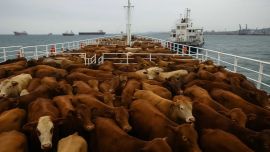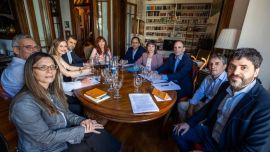In wintry weather and under makeshift shelters, some 2,500 families have been defying the courts – and Covid-19 – for over a month, occupying land on the southern fringes of Buenos Aires, Argentina’s most densely populated province.
"Here there are jobless people, families who can no longer pay the rent and others tired of living in overcrowded conditions or on the street," sums up Yamila, 25, one of the squatters, for AFP.
In her own case, the unemployed social worker is hoping to escape overcrowding. The economic crisis drove her back to her mother’s home, where she lives with eight siblings.
Huddled into 100 hectares of wasteland in Guernica, in the second belt of southern Greater Buenos Aires, many use face-masks and each family group maintains social distancing as best it can. Here the coronavirus pandemic is at its most virulent.
A collective of lawyers has filed an injunction to halt eviction, but this week the encampment made headlines as the national and provincial governments made their positions known.
Buenos Aires is Argentina’s richest province. It is also the most contrasting – half its 15 million inhabitants are impoverished.
Most of these are crowded into the districts encircling the capital, Buenos Aires City, together making up the metropolitan area producing until recently 90 percent of the 400,000-plus cases and 8,000-plus deaths from coronavirus in Argentina.
Rubbish and rats
"I was born and grew up in Guernica, which has always been a dump for as long as I can remember," affirms Yamila, pointing to where a ramshackle home is now staked out.
On July 20 a handful of people weeded the wasteland, frisked away the rats and set up house with almost nothing. Within a week there were thousands.
"The economic crisis is very sharp and aggravated by the pandemic. Many of us who could pay the rent had to choose between paying and eating," says Yamila.
President Alberto Fernández imposed a nationwide lockdown on March 20 to stem the advance of the pandemic which, while slowing the curve of contagion, destroyed the most precarious branches of the economy.
Among the occupants of the Guernica lot, located in the Presidente Perón partido, are former domestic service employees, painters, building workers and gardeners.
"They were workers until it all began and misfortune overtook them," Yamila sums up.
A carload of dreams
Jael, 38, has five daughters. They survive on what her husband makes selling sweets and chocolate on Argentina’s trains, which are now half-empty.
When the family heard about the Guernica occupation, they piled all they could into their word-down car.
"We came with the car loaded with dreams and hopes, we brought the mattress and blankets, installing ourselves first under a canvas swimming-pool cover and then with a carpet we found in the street," she explains at the side of her "home," a makeshift hut.
Before arriving, they lived with her mother-in-law and 14 other relatives.
"We slept in the living-room on a mattress for two, both of us and all five girls, there were 22 of us at the table to eat, we couldn’t stand it anymore."
A place of their own is out of their reach.
"We would return home crying, no way we could pay rent, with the pandemic my husband’s work isn’t what it used to be, at times he makes 900 pesos a day when before he made 2,000."
In the midst of the improvised tents smoke rises from a pot, where they are preparing a stew for everyone to share.
"The Argentine Republic is not full of rich people, there are many poor workers who just want to carry on," affirms Jael.
Almost 40 percent of Argentina’s 45 million inhabitants live in poverty, but the figure rises to more than half in some regions.
The country has been in recession since 2018 and its economy will plunge almost 10 percent more this year according to an International Monetary Fund forecast. Private estimates expect a deeper contraction.
Vacant land
Those supporting the claim of the new residents say the Guernica lot has no owner, or at least that nobody has officially claimed it as their own in court.
"If there is no owner, there is no usurpation and hence no crime," assures Eduardo Soares of the lawyers’ union, the sponsor of the Guernica squatters and other land seizures in Buenos Aires Province that have taken place during the pandemic.
A provincial law approved in May suspends foreclosures until September 30. Before then the lawyers are expecting a ruling to safeguard the almost 3,000 children now residing in Guernica.
"We’re families, we just want our own little acre. If we lack food, at least to have a roof over our heads," says Yamila. “That’s a lot for Argentina today.”
by Sonia Avalos & Magalí Cervantes


























Comments